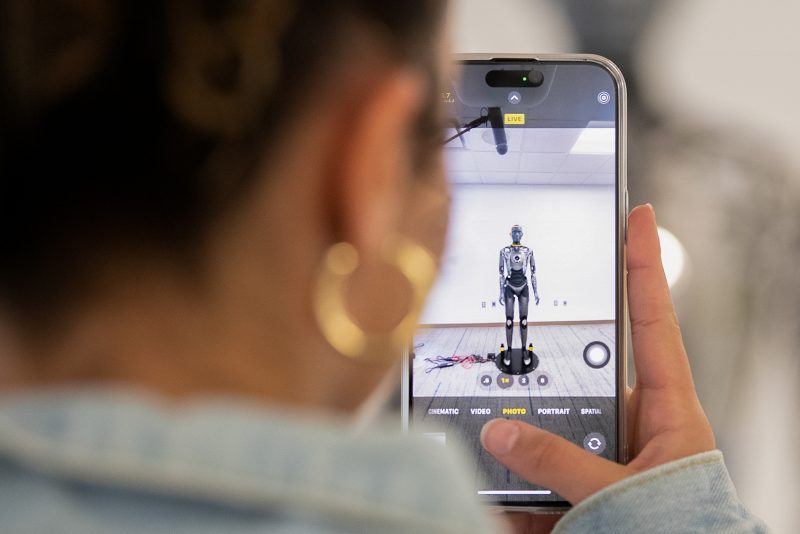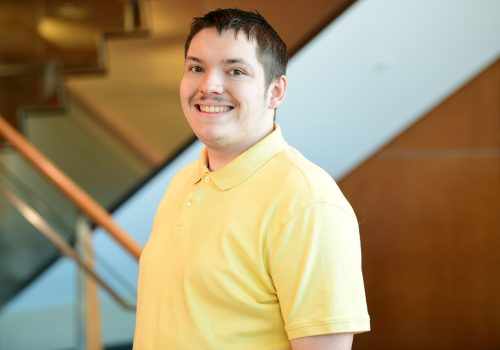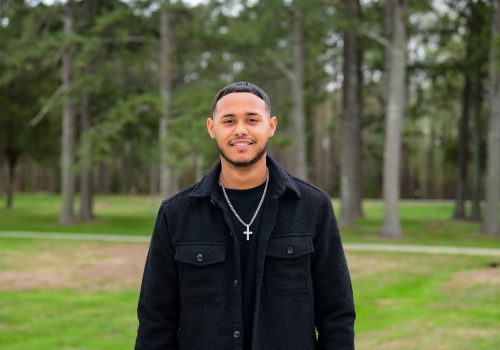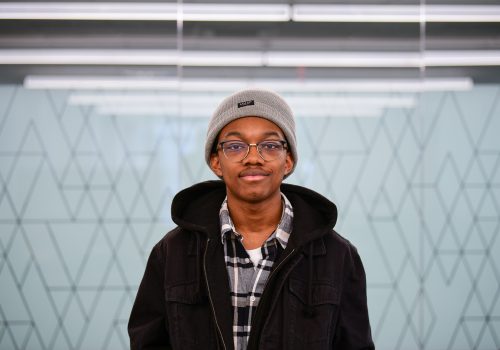World’s Most Advanced Robot Comes to RBC

RBC owns a next-generation humanoid robot driven by cutting-edge AI.
By Sterling Giles
Richard Bland College (RBC) is one of the few institutions of higher learning nationwide with not only one, but two Ameca robots equipped with interactive artificial intelligence (AI). Ameca, the world’s most advanced humanoid robot, is designed to engage with humans in remarkably lifelike and captivating ways. There are only 10 robots plotted worldwide.
The office traverses the world of artificial intelligence (AI) and is It is the world’s most advanced humanoid robot and there are only 10 plotted worldwide.
“Presently, artificial intelligence is ubiquitous in all aspects of life,” said Dr. Kimberly Boyd, RBC Vice President and Chief Research & Innovation Officer. “However, many students have limited access or exposure to this transformative technology.”
Located in a rural community with minimal access to advanced technologies, RBC serves an area with a significant digital disparity. According to LISC Virginia, about one in four households in Petersburg lack access to a computer and one in three are without internet. In response, RBC has committed to expanding STEM-H (Science, Technology, Engineering, Math, and Health Sciences) resources and opportunities for the community.
In the summer of 2024, representatives from the College traveled to London to deepen their understanding of AI and establish a partnership with Engineered Arts—one of the world’s leading humanoid robot manufacturers. Founded in 2004, the company has created and installed more than 100 robots worldwide. Ameca, the latest creation in the Engineered Arts roster, was unveiled in 2021.
“The special sauce of Ameca and a lot of Engineered Arts robots is that sense of human connection that we bring to the table,” said Leo Chen, Engineered Arts Director of U.S. Operations.
Ameca features a powerful Tritium operating system that can be operated remotely and can read virtually all programming languages and software, as well as a host of other cutting-edge features.
The mission and values of the RBC Office of Research & Innovation (ORI) fostered the perfect marriage with Engineered Arts. The ORI is passionate about empowering and equipping learners with tools to help enhance their STEM-H education experiences and workforce opportunities. The robots will facilitate new innovative ways to use AI technology in and out of the classroom.
“The reverberating impact of the College’s partnership with Engineered Arts will be extraordinary,” RBC President Debbie L. Sydow said. “This world-class technology is available to only a handful of universities across the globe, and we believe it will be a differentiator for our students and community.”
RBC received two robots—one stationary, six-foot tall, full-body model and a desktop model. OMNI (Operational Machine Neural Intelligence), the name of the full-body robot, was crowdsourced from the RBC community. The desktop model has the same functionality features as the full-body but doesn’t have arms or legs.
To extend its reach, the ORI also operates a Mobile Career Exploration Unit that travels statewide, bringing the desktop robot, drones and virtual reality (VR) tools to rural areas. The VR technology supports study abroad awareness and prospective student engagement through interactive Marketing and Admissions content.
The robots are also integral to RBC’s new Academic Innovation Center (AIC)—a 24,000-square-foot facility connected to the newly renovated library. The AIC offers advanced classrooms, collaborative space and serves as a hub for STEM-H education and research.
Courtney Boyd, RBC Instructor of Computer Science, envisions pushing the technology even further by integrating the robots with the ORI’s newly acquired AI-powered robotic dogs. She’s working on programming the humanoids to train the robotic canines—an innovative use case rarely seen in higher education.
“I can envision robotic dogs walking through campus while OMNI is telling them what to do,” Courtney said. “There are applications for AI-controlled robotic dogs in agriculture, data center management, rescue support and more.”
Courtney also plans to train ORI interns in programming unique robot personas using Python and is developing custom VR learning experiences tailored for individual students and faculty.
Dr. Dave Morgan, RBC Academic Professor of Physics, has plans to utilize the humanoids for personalized tutoring, language translation, accessibility services and research on the social aspects of human-robot interaction.
“As we integrate the robots into our curriculum, I foresee tremendous potential in how they can enhance our students’ learning experiences,” Dr. Morgan said. “Our goal is to create a more inclusive, accessible and engaging learning experience for all.”
Understanding the need for cultural sensitivity, RBC collaborated closely with Engineered Arts to ensure the robots’ software properly reflects and respects the diversity of the Crater Region. This attention to detail follows concerns about AI systems failing to recognize or represent diverse communities accurately.
“Artificial intelligence right now, or at least large language models, are trained on existing data sets, and unfortunately, these data sets already have inherent bias,” Chen explained. “There’s no getting around it.
“It’s up to the people who utilize the technology to test it and be mindful about this inherent bias, to make sure that we can account for it and that it doesn’t continue to be a self-fulfilling, feedback loop.”
Naomi Hart, Market Development Lead at Engineered Arts, added, “Knowledge is power. “When people get first-hand exposure to the technology, they grow comfortable after just a couple of seconds.”
Recently, the ORI hosted a Sneaker Ball fundraiser to introduce OMNI to the public and support student scholarships. Attendees were amazed by the robot’s human-like interaction.
“There are many people that can’t even fathom something like OMNI or virtual reality,” Dr. Boyd said. “Awareness and education are my goal with the robots.”
With its bold investment in AI and robotics, Richard Bland College is emerging as a statewide leader in STEM-H education. The presence of the humanoids not only enriches the learning environment but also expands access and opportunity for students and the broader community.
“Our investment in world-class AI technology is not just advancing education—it’s positioning us ahead of other institutions in the region,” Dr. Sydow said. “We’re creating smarter pathways to student success, setting a new standard for what modern learning can achieve.”


